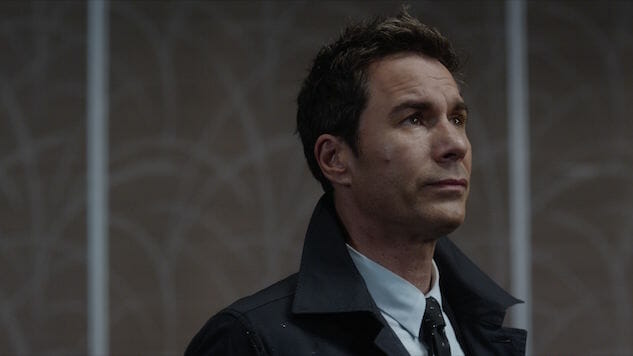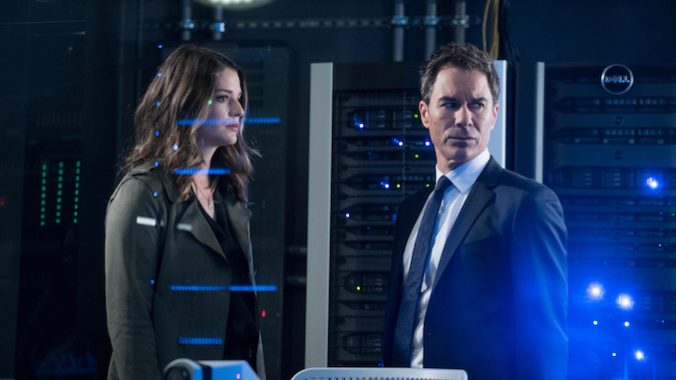TV Rewind: Netflix’s Travelers Was Radical Environmentalism in Stealth Mode
Photo Courtesy of Netflix
Editor’s Note: Welcome to our TV Rewind column! The Paste writers are diving into the streaming catalogue to discuss some of our favorite classic series as well as great shows we’re watching for the first time. Come relive your TV past with us, or discover what should be your next binge watch below:

“We, the last unbroken remnants, vow to undo the errors of our ascendants, to make the Earth whole, the lost unlost, at peril of our own birth.” – The Prayer of the Travelers
You don’t travel through time without a reason. Personal enrichment is a classic: Biff and the Grays Sports Almanac; Tim and his endless re-wooing of an oblivious Rachel McAdams; Nadia and the gold Krugerrands. So is figuring out your family’s past to make peace with their present: Marty and his hot-to-trot teen parents; Peggy Sue and her singing, teenaged Nic Cage; Nadia and the gold Krugerrands. Adventure, also, is a big seller—you don’t get 50 years of Doctor Who without a human drive to up and allons-y.
But if you’re to believe the majority of time travel stories Hollywood’s brought to screens large and small over the last few decades, by far the most compelling reason that might drive someone to assume the existential risks that come hand in hand with traveling through time is to protect the future from humankind’s own worst impulses. Legends of Tomorrow. 12 Monkeys. Continuum. Timeless. Star Trek: Discovery. Arguably, most of Doctor Who. (More often than not, the invitation to adventure is just the hook.) And that’s not even counting all the time-travel-as-existential-defense shows that are currently in production: NBC’s Quantum Leap is doing as much to tell a meta story about the work of protecting humanity from itself as it is reveling in Ben’s era-leaping adventure-of-the-week, while TNT’s forthcoming The Lazarus Project is set to interrogate anew that classic of ethical time travel quandaries: do you save the life of one person, if the cost is the future lives of millions more? And then, of course, there’s whatever it is Loki is doing.
Still, for all the shows we’ve gotten over the years that have effectively used the tropes of time travel to make the case that those of us watching from the present both can and should participate more actively in the project of a building a better future, not enough of them, to my mind, have pivoted on the most pressing crisis facing all 8.03 billion of us at this historical moment: climate change. And not just climate change as an environmental issue—climate change as a driver of devastating geographical, social, and political change. The climate crisis is the domino effect writ large, which—as anyone who vibes not just with time travel stories but also with television as a narrative mode will understand implicitly—makes it the perfect subject for the longform, serialized storytelling TV excels at.
And yet, barring the imaginative time travel to a climate-devastated future that didactic dramas like TNT’s Snowpiercer and Apple TV+’s Extrapolations ask their audiences to join in on (which, side note, let Daveed Diggs’ next project be set in a world filled with joy!!) the only time travel show I can think of that is explicitly about the worst case scenario facing humanity if we stay on our current profit-over-planet political path is Travelers, a canceled-before-its-time co-production of Netflix (US) and Showcase (Canada) that ran for three seasons from 2016 through 2018.

-

-

-

-

-

-

-

-

-

-

-

-

-

-

-

-

-

-

-

-

-

-

-

-

-

-

-

-

-

-

-

-

-

-

-

-

-

-

-

-








































